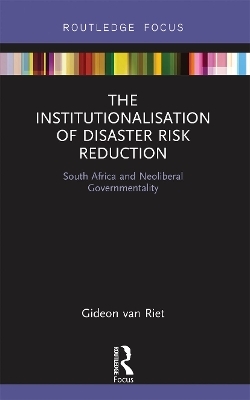
The Institutionalisation of Disaster Risk Reduction
South Africa and Neoliberal Governmentality
Seiten
2020
Routledge (Verlag)
978-0-367-67051-1 (ISBN)
Routledge (Verlag)
978-0-367-67051-1 (ISBN)
The past three decades have seen a global shift in disaster management from an event driven response to a ‘could-be’ risk management approach. Disaster Risk Reduction (DRR) has become entrenched as a dominant paradigm within the field of disaster management. More than a decade after adopting DRR legislation in South Africa there remains a dearth
The past three decades have seen a global shift in disaster management from an event driven response to a ‘could-be’ risk management approach. Disaster risk reduction (DRR) has become entrenched as a dominant paradigm within the field of disaster management.
More than a decade after adopting DRR legislation in South Africa there remains a dearth of evidence that this has translated into substantive action. This book examines the institutionalisation of DRR in South Africa, conceived of as a political economy of knowledge production. Using a critical theory approach, the book does not consider why DRR is failing but instead asks ‘why DRR?’ As such, it explores possibilities beyond DRR’s narrow optic and offers new insights into disaster management through the lens of South Africa.
This is valuable reading for graduate students and academics working in disaster studies, geography, public policy and development/post-development studies, as well as policy makers.
The past three decades have seen a global shift in disaster management from an event driven response to a ‘could-be’ risk management approach. Disaster risk reduction (DRR) has become entrenched as a dominant paradigm within the field of disaster management.
More than a decade after adopting DRR legislation in South Africa there remains a dearth of evidence that this has translated into substantive action. This book examines the institutionalisation of DRR in South Africa, conceived of as a political economy of knowledge production. Using a critical theory approach, the book does not consider why DRR is failing but instead asks ‘why DRR?’ As such, it explores possibilities beyond DRR’s narrow optic and offers new insights into disaster management through the lens of South Africa.
This is valuable reading for graduate students and academics working in disaster studies, geography, public policy and development/post-development studies, as well as policy makers.
Gideon van Riet is Senior Lecturer in Political Studies at North-West University’s Potchefstroom Campus in South Africa.
Introduction 1. A genealogy of disaster risk assessment and management 2. South Africa’s disaster risk profile 3. Writing structural violence: conceptualising ordinary South African being 4. Modes of institutionalisation 5. Knowledge production 6. Multiple dystopias Conclusion: (un)framing risk as a techno-political instrument
| Erscheinungsdatum | 01.10.2020 |
|---|---|
| Reihe/Serie | Routledge Studies in Hazards, Disaster Risk and Climate Change |
| Verlagsort | London |
| Sprache | englisch |
| Maße | 138 x 216 mm |
| Gewicht | 453 g |
| Themenwelt | Naturwissenschaften ► Geowissenschaften ► Geografie / Kartografie |
| Sozialwissenschaften ► Soziologie ► Makrosoziologie | |
| ISBN-10 | 0-367-67051-8 / 0367670518 |
| ISBN-13 | 978-0-367-67051-1 / 9780367670511 |
| Zustand | Neuware |
| Informationen gemäß Produktsicherheitsverordnung (GPSR) | |
| Haben Sie eine Frage zum Produkt? |
Mehr entdecken
aus dem Bereich
aus dem Bereich
über eine faszinierende Welt zwischen Wasser und Land und warum sie …
Buch | Hardcover (2023)
dtv (Verlag)
CHF 33,55
Eine Einführung in die spezielle Mineralogie, Petrologie und …
Buch | Hardcover (2022)
Springer Spektrum (Verlag)
CHF 83,95


